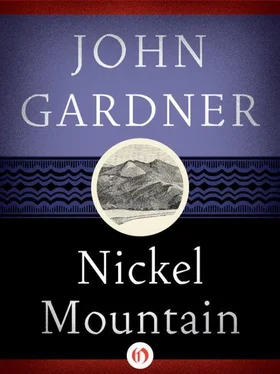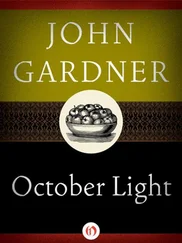John Gardner
Nickel Mountain
In December, 1954, Henry Soames would hardly have said his life was just beginning. His heart was bad, business at the Stop-Off had never been worse, he was close to a nervous breakdown.
Sometimes when he was not in a mood to read he would stand at the window and watch the snow. On windy nights the snow hurtled down through the mountain’s darkness and into the blue-white glow of the diner and the pink glitter of the neon sign and away again into the farther darkness and the woods on the other side of the highway. Henry Soames would pull at his lip with his thumb and first finger, vaguely afraid of the storm and vaguely drawn by it. He would imagine shapes in the snow that shot past, mainly his own huge, lumbering shape, but sometimes that of some ominous stranger. Though he stood in the lean-to room behind the diner he could hear the hum of the diner clock, and sometimes he would see in his mind the red and blue hands and, unaware of what he was doing, would try to make out what time it was — twelve, one, quarter-to-three. … At last, he would sink down on the bed and would lie there solid as a mountain, moving only his nose and lips a little, troubled by dreams.
Even when they interrupted his sleep he was always glad when people came, that winter. The diner lights were always on, and people knew he didn’t mind being roused. The Stop-Off was the last place until you got to the outskirts of Slater, and if the weather was bad, the Stop-Off could be a godsend. Henry would call out, “I’ll be right with you,” and he’d pull on his robe and hurry to the counter, blinking, and he’d yell, “Great weather for polar bears,” and he’d laugh, grim, not fully awake, and would slap the man on the shoulder. Generally it would be drunks that came after two — old men with bad teeth, or no teeth, and liver spots and hair that needed cutting. One old man came especially often, a heavy, dignified old Russian, or a Pole perhaps, named Kuzitski. A junk dealer. He drove an old blue Chevy truck with his name and phone number lettered on the door, and he always wore a suit and vest and in winter a great black coat he’d bought for a song, long ago, at the bus depot in New Carthage. His walk was slow and determined, seemingly not the walk of a drunk but that of a man engrossed. He would seat himself very solemnly and would meditate, then remove his hat and place it on the counter, and finally, politely, he would ask for coffee. There would be beads of ice on his moustache. Henry would serve the man his coffee and would serve himself a piece of apple pie and he’d stand behind the counter while the old man poured whiskey into his coffee and drank. Sometimes after Kuzitski’s second cup, Henry would mention his heart.
“They give me a year to live, Mr. Kuzitski,” Henry would say. “I had one heart attack already.” His tone never quite went with the words, but the old man could no doubt see that Henry was a frightened man. “I get dizzy spells,” Henry would say.
Kuzitski would nod sadly, and after a while he would say politely, “Sister of mine had that trouble.”
Henry Soames would shake his head and look out the window at the snow and after a minute he would say, laughing shortly, “Well, we all go sometime.”
Occasionally he would let it go at that. More often he would press further. He probably had no idea how often he’d said it, the very same words, the same high-pitched voice; certainly Mr. Kuzitski had no idea. “It’s a hell of a thing. You just can’t make yourself believe it, that’s the worst of it. They told me, ‘You just lose ninety pounds and you’ll live for another twenty years’; but you think I can do it?” He would shake his head. “It’s a funny damn world.” He would turn and squint out the window a while, trying to think about it, sensing the profundity of it but unable to find the words to express it even to himself. Vague images would come: children, trees, dogs, red brick houses, people he knew. He felt nothing; a heaviness only, a numbness in the chest.
“Nobody ever would marry her,” old Kuzitski would say. “I should have loaded her up in the truck and hauled her away to the dump. Ha ha.”
Henry would eat, glum, and then he would lean on the counter, looking at his huge, hairy-backed hands, and to fill the silence he would say more. He always spoke calmly at first. He would tell about his father, how he’d had the same trouble, and he’d talk about all a man wanted to do that he never got done, never got around to — places he meant to go, things he promised himself he’d see. “Jesus.” Shaking his head.
Henry would begin to pace then, still talking. It seemed to make Mr. Kuzitski uneasy, but Henry had to do it nevertheless. The sound of voices in the diner at three in the morning filled him with a kind of hunger. He would grow excited, gradually, and his words would come faster, and something that rarely showed in him at other times would show in him now: a streak of crazy violence. Like a drunken man, he would clutch his fists against his chest and his voice would get louder and higher in pitch, and sometimes he’d stop pacing to pound the counter or a tabletop, or he’d lift a sugar dispenser and hold it tight in his hand as if thinking of throwing it. Mr. Kuzitski would sit precariously balanced, his widened eyes fixed on the sugar dispenser. Henry must have seen the hopelessness of trying to put what he meant into words, whatever it was, if anything, that he meant. He would check himself, straining to face death bravely, gallantly. But he was a weak man and childish, especially late at night, and all at once he would catch the old man’s arm and would cling to him, not shouting now but hissing at him like a snake. His eyes would bulge, and tears would run down to the stubble on his fat jowl. Kuzitski would look down at the floor and, clinging to the counter, would recoil from Henry’s grasp.
Though it happened again and again that winter, neither of them was ever ready for it. Henry would be shocked and humiliated, and would apologize and curse himself. He would cover his face with his hands, rubbing his eyes like a bear, and sometimes he would lean on the counter and sob, and Kuzitski would rise and would back away toward the door. “I promise you, I’ll mention this to no one,” Kuzitski would say.
“Thank you, I know I can trust you,” Henry would say, crying.
“Not a living soul, no one; I give you my word,” Kuzitski would say, and slowly, ponderously, he would leave. Henry would see the wind snatch fiercely at the old man’s black coat, and he would feel great compassion.
The old man’s promise was sincere: In a general, somewhat foggy way he felt sorry for Henry, and when the taverns closed on a winter night there would be nowhere left to go but home if bad blood between himself and Henry Soames should rule out the Stop-Off. Nevertheless, he forgot to keep his promise, and it came to be understood that Henry Soames was not himself. People began to be unnaturally polite to him and to ask him too often about his health. Little by little, old Kuzitski’s experience became a common one. People talked among themselves about the violent streak in Henry Soames (not that they lacked any trace of compassion: The fact remained that the thing was obscene), and they observed that, looking back, one could see that it hadn’t come up miraculously out of nowhere. Many a time on a warm summer night he’d locked up his diner and got out his old Ford car and roared up Nickel Mountain like a man hell-bent on destroying himself and maybe collapsing the side of the mountain with him. As for Henry himself, he preferred not to think about it. He watched the snow, his car locked in the garage by drifts, and he waited. Then came spring.
Читать дальше











